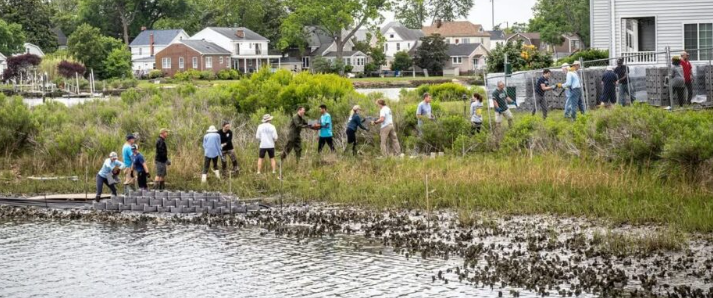The following blog was written by Céire Kealty and published by Focolare Media. You can read the original blog here.
Every day, I learn of a new environmental calamity—from another species wiped out due to human activity, to ecosystems strained by corporate overconsumption. Sometimes these crises stop me in my tracks and paralyze me. The scope of these and other climate challenges are overwhelming. And while I may feel energized to respond to these and other environmental “sins” with reparative actions, I’m often at a loss of where to start. How should we begin to make amends with God’s green earth?
To begin this work, we need to embrace changes—not only on a structural level, but also on a personal level. The Christian tradition recognizes that at the heart of the ecological crisis is a spiritual crisis: humankind has forgotten its place in the world. We have abandoned our role as stewards over creation in favor of dominating God’s green earth through profit-driven means. By straining ecological systems, we scorn God’s intelligent design and assert our own power. And the result has been devastating.
In his 2015 encyclical Laudato Si’, Pope Francis confronts this deep-seated spiritual crisis by inviting Christians to embrace a new way of seeing, thinking, and acting. Francis begins this work by introducing the concept of integral ecology, which he explains as the essential interrelatedness of all beings. Drawing humankind humbly towards the expansive network of creation, Francis explains: “Living beings are part of a network which we will never fully explore and understand” (§138). We are not isolated beings—we are dynamic creatures interacting with other creatures in a constellation of relationships, even when we don’t realize it. In Francis’ own words, “We are part of nature, included in it, and thus in constant interaction with it” (§139).
Francis’ words hold true when we take stock of our lives, especially in the least obvious of places. Consider, for instance, the contents of our wardrobe. When we get dressed in the morning, we may automatically put on work clothes with little thought to their deeper contents. Integral ecology, however, challenges us to look more closely at the traces of life residing in the most mundane of places.
Each morning, I put on a professional outfit for work. In warmer months, I opt for breezier pieces, like cotton or linen blouses. A pressed linen blouse may appear lifeless—but if we approach our clothes from the vantage point of integral ecology, our perception deepens. A garment contains a wealth of relationships, from the fiber weavers who picked the flax plant and spun it into linen cloth, to the garment makers who sewed the cloth into a garment. They may not be physically present to me, but their handiwork is present in this garment. So, too, is the flax plant that comprises the blouse, nurtured by soil on a plot of land I may never see.
Getting dressed every morning involves me in a series of relationships and connects me to communities that may evade my gaze but remain present in my daily dress. Integral ecology enables me to see this greater reality. By approaching creation and created goods as “bursting with presence,” I expand my understanding of community, recognizing my neighbors across great distance.
This all sounds well and good—but what are the broader implications? To be in community with someone is not mere sentimentalism. When I am in community with someone, I’m responsible for them. I have obligations towards them. I consider their needs and honor them. So, if I am to take the connections forged through creation and created goods seriously, then I must reckon with my responsibility.
Sticking with the example of my wardrobe, garments are forged through relationships; they also are forged in a system that’s riddled with humanitarian and environmental sins. For example, the people that make our clothes—garment makers throughout the world—endure exploitative working conditions, scant pay, and threats to their bodily health. Their undignified working conditions betray the dignity owed to humankind.
To be in community with someone is not mere sentimentalism. When I am in community with someone, I’m responsible for them.
These indignities extend to the earth, too. The apparel industry is responsible for an estimated 8 to 10 percent of global carbon emissions. Excessive clothing production cycles—known as fast fashion—strain the planet’s resources. Apparel production is a “thirsty” process, as it takes approximately 3,000 liters of water for one cotton shirt. Other processes, such as apparel dyeing, are highly pollutive. Textile dyeing is attributed to 20 percent of wastewater worldwide. This pollution places a significant strain on ecosystems and communities in the Global South, where most apparel production occurs. And, of course, with overconsumption comes over-discarding. When consumers in the Global North dispense with their excess clothes—to the tune of 81-100 pounds per U.S. consumer—they are sent to landfill, or sent to countries like Ghana. There, our clothes overwhelm local economies, pollute vulnerable communities, and rot in waterways.
By apprehending our clothes and other created goods, in the spirit of integral ecology, we encounter a deluge of wounds borne by God’s creatures and creation. Looking closer at my clothes has provided the occasion for me to recognize my errors and failures, as an individual and as a Christian member of the broader human and earthen community—and something curious has then taken place. When I think of the wounds intertwined in my favorite clothes, I’m moved—to make amends, to repent, and repair. In encountering the sorrows stitched in my clothes, I desire to change, so that I might honor my human and non-human neighbors near or far.
In practice, this desire to change has manifested in individual and communal actions. I have begun to learn how to mend my clothes. I try and buy less, and ignore micro-trend cycles. I have directed my attention away from retail therapy and towards environmental and labor legislation, like The Fabric Act and The Slow Fashion Caucus. I have supported pressure campaigns combatting garment worker wage theft and overconsumption alongside fellow citizens. And I have educated students and colleagues on justice movements in the global garment industry. In these and other ways, I’ve used my time, money, words, and deeds to enact change in the world—and change in myself.
This desire to change is intuitive: Pope Francis insists that the ecological crisis (which also is a humanitarian crisis) is “a summons to a profound interior conversion” (§217). A conversion of the heart is a welcome outcome in reckoning with environmental and humanitarian calamities. Yet this conversion cannot happen in isolation. Francis urges that “the ecological conversion needed to bring about lasting change is also a community conversion” (§219). As many climate and social activists know, social problems must be addressed by community networks, “and not simply by the sum of individual good deeds” (§219).
So, if we are to honor our neighbors and God’s green earth through responsive actions, we must pursue communal conversion. In practice, this means policy and protest. In the instance of clothing, we can heed the efforts of policymakers who are supporting environmental reform in the global garment industry. This past June, U.S. representatives introduced a Slow Fashion Caucus, to prompt climate-clothing discussions, organize support for climate-conscious legislation, and build coalitions across constituencies. Beyond the U.S., European lawmakers are advancing legislation, such as extended-producer responsibility laws, that will hold apparel producers responsible for textile waste. And amidst this work, consumers are organizing in droves to pressure corporations to concede to these demands.
The possibilities for mending our environmental and social wounds are endless. But it remains necessary that we act with a renewed awareness of our place in the world. The Catholic tradition is invaluable in these efforts, by reminding us that we are God’s beloved creature, among other beloved creatures.
In our world of streamlined processes, we can forget how connected we are. We can lose sight of the people, places, and ecosystems that ground our lives. Amidst mounting climate challenges, this forgetfulness can make us feel terribly alone. Yet as Francis illustrates in Laudato Si’, we are not alone. We are in community with God’s glorious creation always—so we should act accordingly.


